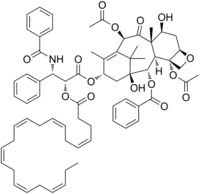DHA-paclitaxel
 | |
| Names | |
|---|---|
| Preferred IUPAC name
(2aR,4S,4aS,6R,9S,11S,12S,12aR,12bS)-6,12b-Bis(acetyloxy)-9-{[(2R,3S)-3-benzamido-2-{[(4Z,7Z,10Z,13Z,16Z,19Z)-docosa-4,7,10,13,16,19-hexaenoyl]oxy}-3-phenylpropanoyl]oxy}-4,11-dihydroxy-4a,8,13,13-tetramethyl-5-oxo-2a,3,4,4a,5,6,9,10,11,12,12a,12b-dodecahydro-1H-7,11-methano[1]benzoxeto[3,4-a][10]annulen-12-yl benzoate | |
| Other names
Docosahexaenoyl-paclitaxel; Taxoprexin | |
| Identifiers | |
CAS Number |
|
3D model (JSmol) |
|
| ChemSpider | |
PubChem CID |
|
| UNII | |
CompTox Dashboard (EPA) |
|
InChI
| |
SMILES
| |
| Properties | |
Chemical formula |
C69H81NO15 |
| Molar mass | 1164.399 g·mol−1 |
Except where otherwise noted, data are given for materials in their standard state (at 25 °C [77 °F], 100 kPa). | |
| Infobox references | |
DHA-paclitaxel (or Taxoprexin) is an investigational drug (from Protarga Inc) made by linking paclitaxel to docosahexaenoic acid (DHA), a fatty acid that is easily taken up by tumor cells; the DHA-paclitaxel “appears not to be cytotoxic until the bond with DHA is cleaved within the cell.”[1] The advantage of DHA-paclitaxel over paclitaxel is DHA-paclitaxel's ability to carry much higher concentrations of paclitaxel to the cells, which are maintained for longer periods in the tumor cells, thus increasing their action. With increased activity, DHA-paclitaxel, also known as Taxoprexin, may have a more successful response in cancer patients than Taxol, and it may be able to treat more types of cancer than Taxol has been able to treat.
Clinical trials
In 2007, a phase II clinical trial reported "modest activity in patients with oesophago-gastric cancer".[2]
References
- ↑ Whelan, Jo (2002). "Targeted taxane therapy for cancer". Drug Discovery Today. 7 (2): 90–92. doi:10.1016/S1359-6446(01)02149-3. PMID 11790612.
- ↑ Jones, RJ; Hawkins, RE; Eatock, MM; Ferry, DR; Eskens, FA; Wilke, H; Evans, TR (2008). "A phase II open-label study of DHA-paclitaxel (Taxoprexin) by 2-h intravenous infusion in previously untreated patients with locally advanced or metastatic gastric or oesophageal adenocarcinoma". Cancer Chemotherapy and Pharmacology. 61 (3): 435–41. doi:10.1007/s00280-007-0486-8. PMID 17440725.